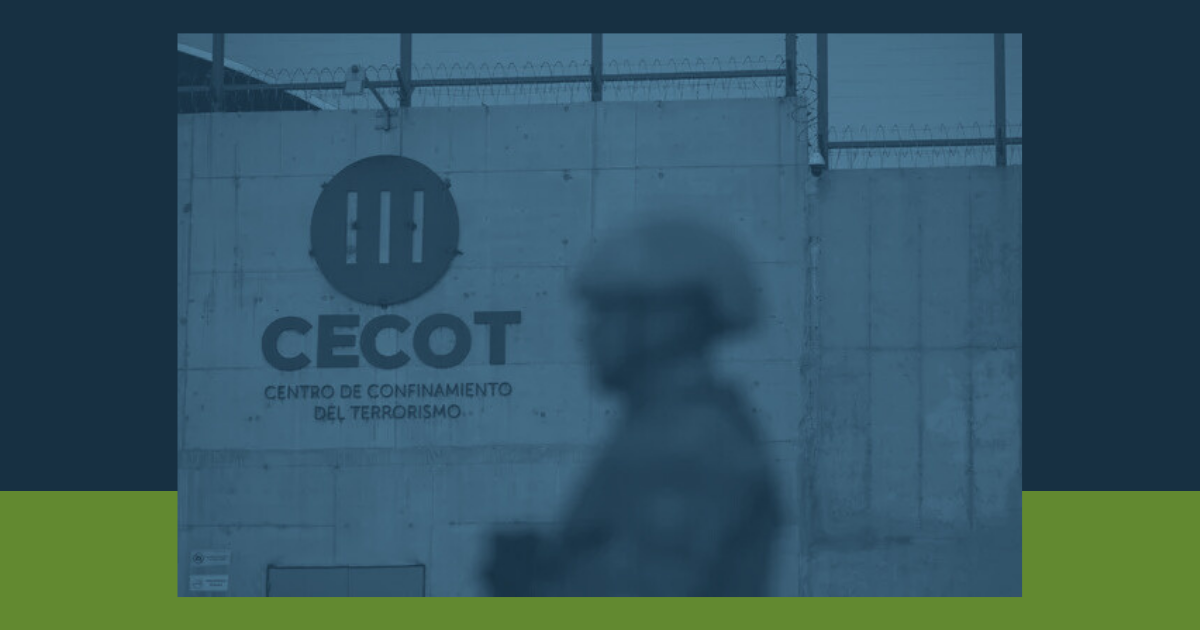By Dr. Mneesha Gellman in Collaboration with The Im/migrant Well-Being Scholar Collaborative
May 2025
INTRODUCTION
President Nayib Bukele of El Salvador has offered to house “dangerous American criminals” sent from the United States to be incarcerated in El Salvador, for a fee. On March 15th 2025, President Trump invoked the 1798 Alien Enemies Act in removing people from the U.S. to El Salvador’s prisons. The wartime act has been invoked only three times, including to justify Japanese internment during World War II. Despite a judge’s order temporarily blocking the move, the first planeload of people was sent to El Salvador on March 16, 2025, including Kilmar Abrego Garcia. President Trump encouraged Bukele to build more prisons in an April 14th White House meeting. As this policy brief explains, El Salvador’s prison system is characterized by widespread human rights abuses. As both Bukele and Trump attempt to further their political and policy agendas, their joining forces has major implications for democratic backsliding and human rights erosion in both countries – with acute negative consequences for immigrant well-being.
BACKGROUND
The U.S. has iteratively experimented with both immigration and incarceration practices to limit human mobility and restrict well-being. While the Chinese Exclusion Act of 1882 was the first exclusionary immigration policy targeting a specific population within the U.S., such policies, and their evolution into country-of-origin quotas, have been implemented intermittently in U.S. history. Trump’s policy is not the first instance of the U.S. being involved in detainment overseas. Sending people to prisons outside the U.S. has occurred via CIA black sites in countries like Afghanistan and Guantanamo Bay, Cuba. However, in these cases, detainees are incarcerated by U.S. officials under U.S. purview. To send detainees to another country, to be incarcerated under the purview of said country, is unprecedented. El Salvador’s offer to house people from any country of origin that the U.S. deems removable brings with it many risks to human rights and democracy more broadly.
FINDINGS ON PRISONS IN EL SALVADOR
Bukele was elected democratically in 2019 by vowing to address crime, which he did in part by collaborating with Salvadoran gangs. When the collaboration collapsed in March 2022, Bukele immediately declared a “state of exception” that he used to crack down on gangs and anyone else deemed a threat, and since then, he has governed with few checks and balances. The state of exception includes vastly expanded executive power coupled with the elimination of due process and many civil rights. Mass arrests with no evidence beyond an allegation, indefinite confinement with no bail or legal counsel, and a blackout on contact with incarcerated people, including no phone calls, mail, or visits, are all part of Bukele’s extraordinary measures. More than 85,000 people have been incarcerated under the state of exception, a tripling of the incarcerated population. Suspending constitutional rights, Bukele rewrote the constitution so he could be reelected in 2024.
The individuals removed from the United States to El Salvador are now in a prison system characterized by widespread human rights abuses at the hands of state forces. The lack of contact makes it nearly impossible for people to determine the well-being of their incarcerated family members. Despite the general blackout, scholars, international and national rights’ groups and investigative journalists have been able to develop a picture of conditions inside El Salvador’s prisons through interviews with some of the few political prisoners who have been released, family members of incarcerated people, and analyses of prison deaths. Facts on the ground show that:
- The U.S. State Department’s 2023 country report on El Salvador noted “harsh and life-threatening prison conditions.”
- Incarcerated Salvadorans are packed into grossly overcrowded cells, beaten and tortured with electric shocks by prison personnel, and denied medicine and deprived of food.
- El Salvador is a signatory to the United Nations’ Convention Against Torture, yet Amnesty International concludes there is “systemic use of torture” in its prisons. Bukele and his cabinet members have made statements inciting torture and could constitute crimes against humanity.
- Human rights NGO Cristosal determined in 2024 that “torture has become a state policy.” This study included forensic analysis of exhumed bodies of people who died in prison and estimates that hundreds have died from malnutrition, blunt force trauma, strangulation and lack of lifesaving medical treatment; bodies are buried in mass graves.
- Bukele built and opened the Terrorism Confinement Center (CECOT), a mega-prison, in 2023. Mimicking what has become standard practice under Bukele’s state of exception, the people sent from the U.S. to CECOT did not have hearings to contest allegations against them—they were labeled as gang members and put on deportation flights. Attorneys for dozens of the Venezuelans have stated they are not gang members.
In spite of these conditions, Secretary of State Marco Rubio recently “certified” El Salvador as taking measures to uphold the rule of law.
RECOMMENDATIONS
- The United States should cease all deportations and removals of people from the U.S. to El Salvador or any other foreign facilities. This includes people already in criminal or immigration detention, as well as any non-detained people.
- Neither Congress nor the Trump administration should enter into any further agreements to house anyone removed from the U.S. in Salvadoran prisons, as El Salvador cannot guarantee the safety and rights of people detained there.
- The Trump administration should immediately seek the return of people already sent to El Salvador from the U.S., including Kilmar Abrego Garcia.
- The Secretary of State should ensure that if immigrants with adjudicated cases and no claims for relief are designated for removal, they should be afforded due process and sent to their designated country of removal (provided it is the country of nationality or last habitual residence).
- The Secretary of State and Attorney General should make sure that people with unadjudicated cases that can present claims for protection from removal can await adjudication of their claims in the United States, including the exhaustion of appeals.
- Congress should refrain from providing additional funding to the Department of Homeland Security (DHS) for Immigration and Customs Enforcement (ICE) and U.S. Customs and Border Protection (CBP) until the above recommendations are implemented.

